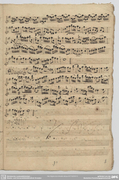Knowing what exists: Union of German Academies renews support for RISM Germany
Karl Wilhelm Geck
Thursday, January 15, 2015

This article is by our RISM Germany colleague Karl Wilhelm Geck and has been republished from BIS: Das Magazin der Bibliotheken in Sachsen 7:3 (2014), 179 (CC-BY SA):
Where the documentation of music manuscripts is concerned, the benchmark is the online union catalog http://opac.rism.info. Since its release in 2010, it has been the global showcase for RISM, the Répertoire International des Sources Musicales (International Repertory of Musical Sources). The project is dedicated to cataloging the historical musical sources in the 34 countries in which it is currently active. The catalog records are sent to the RISM Central Office in Frankfurt am Main, which edits and publishes them (see BIS 3 [2010], 180–182).
On the one hand, the RISM online catalog is a tool that allows searches so sophisticated that sometimes even the experts are amazed. This happened when British musicologist Michael Talbot recently discovered, thanks to the catalog’s distinctive on-screen keyboard, that the middle movement of the violin concerto held at the SLUB (Mus.2364-O-7) was not, like the rest of the work, by the longtime Stuttgart court kapellmeister Giuseppe Antonio Brescianello, but instead by Antonio Vivaldi. On the other hand, even simple searches in the RISM catalog can produce significant results. For example, if you do an advanced search for D-* in the field Library siglum, you see that about 42 % of the catalog records in the database (372,124 out of 879,596 as of 30 September 2014) are for manuscripts held in Germany. The numbers substantiate the importance of the RISM working group in Germany for this international cataloging project. They also make it clear that the decision made by the German Academy of Sciences to renew support for the RISM Germany offices at the Bavarian State Library in Munich and at the SLUB in Dresden for another ten years (subject to positive assessment after required periodic reviews), rather than to end funding in 2015 as planned, is not only beneficial for RISM Germany but also for the entire organization.
The main task of both offices—Munich being responsible for the states in former West Germany and Dresden for the former East—is to provide expert cataloging of musical sources, particularly music manuscripts from before 1600 to 1850. Our plans for 2016/2025 include cataloging the remaining ca. 25,000 manuscripts, which means about 75,000 new records total (with on average three records needed per manuscript). We estimate that the Dresden office will create 30,000 records for 10,000 manuscripts found in 222 locations. Among these places are smaller collections overseen by churches or municipalities, but the SLUB—in fifth place with 20,164 records in the RISM catalog—will also benefit from the activities of its in-house office.
In conclusion, let’s point out the mission of RISM. RISM wants to make a vital contribution to the infrastructure of musical research and practice: “Knowing what exists and where it is kept.” In order for this to apply to musical sources, the organization was founded in 1952, the losses from World War Two still fresh. The motto is also relevant in the digital age.
Photo caption: The music to Vivaldi’s Violin Concerto RV 66 (RISM ID no.212001392) can be recognized by the movement’s “Adagio” heading.
Share Tweet EmailCatégorie: A la une

